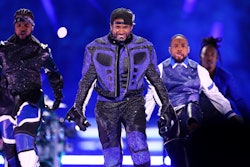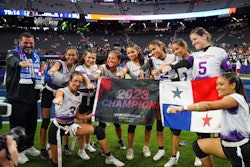
Like any other major corporation or franchise, marketing is key to a sports team. But having a team of players descend on a field isn’t that simple—it requires a venue, whose operations require ticket sales and sponsorships. And to drive those sales, fan engagement and marketing become vital pieces of the puzzle.
Unlike marketing for an experiential event, the sports world is less overt in its product-selling plays, tapping into fans’ passion for viewing in hopes of converting them into customers.
Here, BizBash spoke to three sports marketing veterans, who divulged the top tactics in their playbook for fellow event profs to potentially add to their own roster. You decide which to make the MVP of your next campaign… When asked about the ins and outs of sports marketing, RCX Sports' Jaclyn Thomas says that inclusivity and accessibility are in while text-heavy marketing materials are out.Photo: Courtesy of RCX Sports
When asked about the ins and outs of sports marketing, RCX Sports' Jaclyn Thomas says that inclusivity and accessibility are in while text-heavy marketing materials are out.Photo: Courtesy of RCX Sports
1. Define stakeholder objectives before you start planning.
This is a top play for Jaclyn Thomas, the chief marketing officer of RCX Sports, a youth-sports experiential business that also serves as the exclusive operator of NFL FLAG, the official flag football league of the NFL.
By defining key metrics even before blueprints are laid out, it becomes easier for marketers to know how their budgets are impacted, Thomas tells BizBash, thus “determining the level of marketing you need to bring into the experience.”
“It also helps manage expectations and deliverables” for those stakeholders, Thomas says.
2. Involve the community.
One of the biggest differences between sports marketing and marketing a more traditional celebration is that “fandoms are intense!” says Elliott Curtis, the vice president of creative at Game Seven Agency.
“Whether you're marketing a specific sport, athlete, moment, or product, you're likely speaking to consumers that know more about the topic than you do," he explains. "Just like the players and coaching staff, you have to prepare to bring your A game like there's a lot on the line, or else the fans will let you know about it.”
With that, this play should be an obvious one, Curtis says, noting that it’s ideal to “have folks with authentic connections to the subject matter heavily involved in the creation and planning process.”
“Some consumers are extremely knowledgeable and passionate about the sports space, so make sure to include some subtle details and nuances that let them know your brand gets it," he adds.
3. Get familiar with the terms of partnership deals.
“Almost everything in sports is a sellable property, and most players, teams, and leagues certainly take advantage of that,” Curtis notes. “It is really helpful to know what you have access to and what you don't when it comes to player likeness, team and league IP [intellectual property], and other partners in the space."
Despite potentially stringent guardrails, “this doesn't mean you should completely avoid anything you don't have access to,” Curtis says. Instead, think about ways to get “really creative and own moments [you] typically shouldn’t without breaking any rules.” In the sports world, games could be announced six-plus months in advance, giving marketers a long lead time and the challenge of keeping fans engaged throughout it. Think of it in three stages, Thomas suggests: “marketing that leads up to the event for attendees, during the event to drive interest, and following the event to continue building engagement.”Photo: Courtesy of RCX Sports
In the sports world, games could be announced six-plus months in advance, giving marketers a long lead time and the challenge of keeping fans engaged throughout it. Think of it in three stages, Thomas suggests: “marketing that leads up to the event for attendees, during the event to drive interest, and following the event to continue building engagement.”Photo: Courtesy of RCX Sports
4. Create a not-too-solid promotion plan.
You want to be confident in each of the channels you’re marketing on—as well as the timeline for each deliverable, Thomas says, making sure to be “clearly aligned in every aspect of the campaign” as far as brand messaging and creative assets.” However, in the sports world, you also “need to be ready for any moment and able to adjust on the fly," Thomas says.
“I think all events are like that, but when it comes to sports, something could happen where it could lead you into a new direction,” Thomas notes, such as “factors out of our control like injuries, trades, hot (or cold) streaks, athletes winning or losing a game the night before they are supposed to be appearing at your event—the list goes on,” Curtis adds.
In these instances, “the audience will already be [emotionally] connected,” so don’t be shy in using this to your advantage “to add to the experience,” Thomas says.
5. Don’t force brand deals.
“Forcing brand deals with athletes when it's a stretch or doesn't make sense” is a big red flag, Curtis says. “The best talent deals in sports marketing come from when the athlete or entity has a real connection to the brand or product. If that doesn't exist already, the talent won't be excited to participate, so neither will their fans.”
Also, ditch the athlete-driven contests and sweepstakes, Curtis advises. “Sure, they seem fun, but there is a whole corner of social media now that is filled with bots and scammers that are just looking to win free stuff. These are very likely not the consumer you are trying to build a long-lasting connection with, so the initiative will likely miss the mark.” Joe Silberzweig and Adam Richman, the co-founders and co-CEOs of Medium Rare, the event production company behind Guy Fieri’s Flavortown Tailgate, say: "The best ideas are new ones."Photo: Courtesy of Medium Rare
Joe Silberzweig and Adam Richman, the co-founders and co-CEOs of Medium Rare, the event production company behind Guy Fieri’s Flavortown Tailgate, say: "The best ideas are new ones."Photo: Courtesy of Medium Rare
6. Consider athletes your consumers.
“Especially during big sporting moments where there will be a lot of talent in one city, attempt to build experiences that high-profile athletes would want to be at even if they aren't getting paid,” says Curtis.
Game Seven, for example, produced the Hennessy Arena for the 2023 NBA All-Star Game. “Over 25 NBA and WNBA players were in attendance—a few of whom actually waited in line to get in,” Curtis recalls. “The performances, crowd, interactive elements, and content moments were all vetted to be cool no matter how famous you were, and that showed with the guest list.”
By creating events like this one and “playing into the conversation,” marketers are also able to “make athletes more relatable.”
7. Get to the point!
Joe Silberzweig and Adam Richman, the co-founders and co-CEOs of Medium Rare, the event production company behind Draft Weekend’s Kelce Jam event, say to prioritize simple marketing that’s easy to understand.
To accomplish this, the duo says that refining your copywriting skills is the key to getting ahead.
8. Ditch highly produced social media content.
Lo-fi content is in, Curis says, referring to DIY-type photos or videos that opt for minimal editing that shows off a subject’s personality and embraces imperfections.
“Rather than treating video shoots with athletes as these highly produced, sacred moments, consider finding ways for the athlete to have fun, show off their personality, and spark some engagement with fans,” he adds.
Silberzweig and Richman also say that more authentic content is what’s needed to truly “move the needle.”
“The consumer is smarter than ever, and truly needs to feel the excitement from an athlete or celebrity. A traditional promotional social post just doesn't cut it anymore," they say. Silberzweig and Richman note that more authentic content is what’s needed to truly “move the needle" and increase return on marketing initiatives.Photo: Courtesy of Medium Rare
Silberzweig and Richman note that more authentic content is what’s needed to truly “move the needle" and increase return on marketing initiatives.Photo: Courtesy of Medium Rare
9. The best ideas are new ones.
As Silberzweig and Richman advise: “The best ideas are new ones!” What’s even better is that thinking outside the box “doesn’t require big budgets,” they add.
Thomas also stressed the importance of unique ideas—especially on social media where it’s tougher to stand out. “Don’t underrepresent yourself by following a trend to potentially get seen,” Thomas advises, especially if the opportunity doesn’t fit your brand.
10. Consider how inclusivity and accessibility can draw higher engagement.
Making sure all marketing materials are inclusive and accessible is a tried-and-true method of Thomas’ for increasing engagement, she tells BizBash. Find a clever way to include diverse audiences beyond participating in Pride Month, for example, and be sure to use alt text—descriptions of visual details—on every digital campaign that you can as the tool helps people with visual disabilities peruse the internet.



















